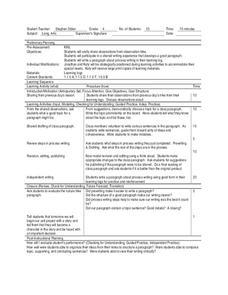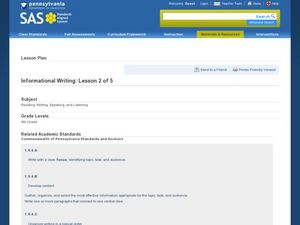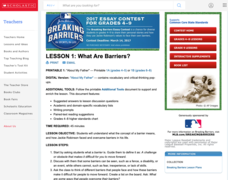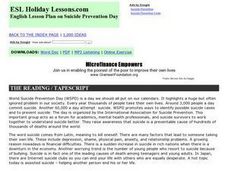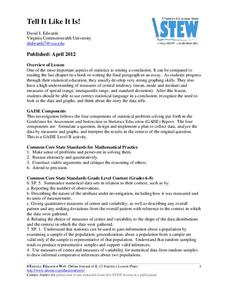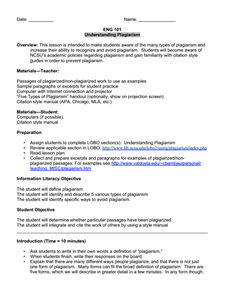Curated OER
What Was That All About?
Through direct instruction, the teacher demonstrates how to identify the main idea and supporting details of a text when creating a summary. As a class, read a paragraph, highlighting relevant information and crossing out extraneous...
Curated OER
Creative Writing
Fourth graders participate in an observation hike in this lesson. They orally share observations from their hike, and develop a paragraph in a shared writing exercise. Finally, the write their paragraph about process writing in their...
Curated OER
Shorten the Length
Learn how to summarize by identifying main ideas and supporting details. Readers cross out unimportant information as they read through a text. Is it a random detail? Cross it out! They then draw a concept map, placing the main idea in...
Curated OER
Summarizing: James and the Giant Peach
Text marking and a T-chart format to distinguish important information from trivia help elementary readers summarize effectively. Encouraging readers to construct a chapter summary from paragraph-level topic sentences is another sound...
Curated OER
American Revolution Vocabulary Cartoons (art)
Fifth graders discuss cartoons. In this art lesson, 5th graders make their own cartoon using vocabulary words from the American Revolution.
Santa Barbara City College
Structure of a General Expository Essay
A great student reference tool and graphic organizer in one worksheet! Young writers can read a detailed description of each section of a standard five-paragraph essay before completing a graphic organized with their own writing. The...
Pennsylvania Department of Education
Informational Writing: Lesson 2 of 5
Introduce expository writing to your elementary learners. Young authors write a three-paragraph informational paper using the steps of the writing process. They follow guided lessons to experience each of five steps. Included are tons of...
University of North Carolina
Summary: Using it Wisely
Sometimes summarizing keeps a writer from going deeper into their analysis—don't fall into that trap. Learn the difference between summarizing and analyzing using an insightful resource. Focusing on introductions, the lesson shares...
University of North Carolina
Latin Terms and Abbreviations
N.B.. cit., n.b., viz., sc., inf. e,g,—these abbreviations frequently appear in academic papers and on works cited lists, but what do they mean? Part of a larger series to improve writing skills, the handout on Latin terms and...
Scholastic
Lesson 1: What Are Barriers?
Scholars discuss the concept of a barrier with a short passage on Jackie Robinson. The writing process begins with a paragraph and several other sentences about Robinson's unique traits that made breaking a barrier possible.
Curated OER
ESL: World Suicide Prevention Day
Help to educate your ESL students about World Suicide Prevention Day with this series of activities. Matching key phrases, completing CLOZE paragraphs, and choosing appropriate words based on context clues are just a few of the many ways...
American Statistical Association
Tell it Like it is!
Scholars apply prior knowledge of statistics to write a conclusion. They summarize using correct academic language and tell the story of the data.
Curated OER
Building an Image Page
Third graders review the menu bar and define terms of some of the icons the key words and how to add clipart to their paper. They type in their written paragraph using the word processor and add at least one clipart to their written...
Curated OER
Scaffolding Academic Learning for Second Language Learners
High schoolers walk through exposure to material on Great Inventions and Transportation using scaffolding techniques such as: language simplification, pre-reading, graphic organizers, note taking and more.
Curated OER
Summarization Superstars
How do you read when you know you're going to be summarizing a text? Summarize a nonfiction text with your upper elementary schoolers. Your pupils independently read a nonfiction article and write a summary paragraph using the six-step...
Curated OER
To Sum it all Up...
Students observe and demonstrate the process of summarizing text. They read and discuss the steps to summarize text, then in small groups read and summarize an article about frogs from "National Geographic" online. Independently they...
K12 Reader
Evaluating in Math
Help kids understand problem-solving strategies by focusing on academic language in a reading comprehension activity. After reading paragraphs about the words solve and evaluate, learners answer five reading comprehension questions.
DocsTeach
Road to Revolution: Patriotism or Treason?
Patriot or traitor? Scholars debate the line between patriotism and treason in a short activity. Academics analyze a political cartoon and discuss varying viewpoints between different groups living in the American colonies. The activity...
Curated OER
Travels With Charley By John Steinbeck
A paragraph from John Steinbeck's Travels with Charley provides English language learners with an opportunity to practice strategies for answering guiding questions about the academic text. Class members locate keywords in the annotated...
Curated OER
Topic Sentences and Transitions
High school writers identify the purpose of both a topic sentence and a transitional statement. They write a topic sentence which denotes the paragraph topic and the author's stand on that topic. Then they write an effective transitional...
Curated OER
Career Planning and Research
What do you want to do when you finish school? Most high schoolers have an idea of what they'd want to do, but little idea of how to achieve this goal. After researching a career of their choosing, learners identify qualifications,...
Curated OER
Truly Amazing Mammals
Explore the world of amazing mammals with your kids with special needs. Each child identifies one mammal from a previous lesson and writes a short paragraph on that mammal. This lesson states that it is intended for all levels, but not...
Curated OER
Progressing Towards Graduation
Eleventh graders write a paragraph about what they are going to do after graduating from high school. As a class, they share how they are going to meet their goals and discuss other options other than going to college. To end the lesson,...
North Carolina State University
Understanding Plagiarism
Introduce budding scholars to the many types of academic plagiarism. Potential plagiarizers develop a definition of the infringement and determine how it has been committed. The instructor provides the writing examples and resources....



